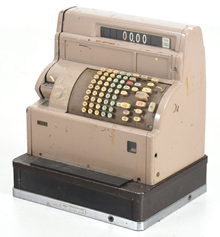Recently I was at a grocery store in our neighborhood that still does a lot of business in cash. As I was waiting, I watched the cashier ring up the customer in front of me. The cashier deftly took the customer’s bill—a $50, I think—and counted out change. When it was my turn, I said “It looks like you’ve been doing this for a while”. “Oh, yes”, she said. “35 years”.
During my college years (1970s), I had a kind of gap year during which I worked for Sears, the once-huge department store. I was hired as a cashier, and the company put us through an extensive training program for the position.
For example, that’s where I learned something that I saw the grocery-store cashier do: when you accept a big bill from a customer, you don’t just stuff it into the tray. You lay it across the tray while you make change. That way, if you make change for a fifty but the customer says, “I gave you a hundred”, you can point at the bill and show that that’s what they’d given you.

Before my timeMy cashiering days were at the beginning of the era of computerized cash registers (no big old NCR ka-ching machine for us). Although our register could calculate change, they still taught us how to count out change manually. (One method is to count up from the purchase price to the amount the customer gave you, as you can see in a video.)
We also learned to handle checks, which included phoning to get an approval code for checks over a certain amount. We learned to test American Express travelers checks to see if they were authentic. We learned to handle credit cards, which we processed using a manual imprinting machine that produced a carbon copy of the transaction.
We also learned to be on guard for various scams, such as the quick-change scams that try to confuse the cashier, as you can see in action in the movie Paper Moon.
There was of course lots more—cashing out the register, doing the weekly “hit report” of mis-entered product codes or prices (this was also before UPC scanners), and many other skills associated with being at the point of sale and handling money.
During my son’s college years (late 2000-oughts), he also worked as a cashier, in his case for Target and for Safeway. I quizzed him about his training. He remembered that the loss-prevention people at Target warned them about the quick-change scam, and it even happened to him once while he worked at Safeway.
 But he doesn’t remember much training about how to handle change; at a lot of places, coin change is automatically dispensed by machine into a little cup. He does remember learning how to handle checks.
But he doesn’t remember much training about how to handle change; at a lot of places, coin change is automatically dispensed by machine into a little cup. He does remember learning how to handle checks.
Most of their training, he remembers, was about how to use the POS terminal[1]—how to log in, how to enter or back out transactions, etc. A POS terminal is, after all, a computer—they were being trained in how to manipulate the computer, and less so than in my day about how to handle cash money.
Shortly after I had my grocery-store experience with the experienced cashier, I was in line at a local coffee shop. The customer ahead of me paid in cash. When I got to the counter, I asked the amenable counter person, “This is going to be a sort of weird question, but how much training did they give you in how to handle cash?” “Little to none”, was her report.
And Friend Alan recounted this experience recently on Facebook about a cashier trying to figure out how to even take cash:
 It might seem like old-school cashiering skills are becoming anachronistic. It’s not unusual in my experience that small shops and pop-up vendors only take cards, using something like Square. Frankly, I was surprised that the coffee shop with the informative counter person even took cash.
It might seem like old-school cashiering skills are becoming anachronistic. It’s not unusual in my experience that small shops and pop-up vendors only take cards, using something like Square. Frankly, I was surprised that the coffee shop with the informative counter person even took cash.
Moreover, we customers are more and more becoming our own cashiers. Many stores nudge customers toward self-checkout kiosks, in part by reducing the number of cashiers so that it’s faster to use the self-checkout.[2] The logical conclusion to this effort is the cashierless store (aka “Just walk out store”), where computers just sense your purchases and charge you.
Still, it’s not like cash is going to go away. Even in the age of debit cards and Venmo, people will still want to use cash for various private transactions.[3] Moreover, not everyone has a bank account, or wants one. Although individual merchants might decide to go card-only, many will still find it to their benefit to take cash.
That probably will continue to include the grocery store where I met the experienced cashier. For the sake of that store, I hope that she is able to pass her experience and training on to other cashiers who work there.
__________
 |
|

 |
|
